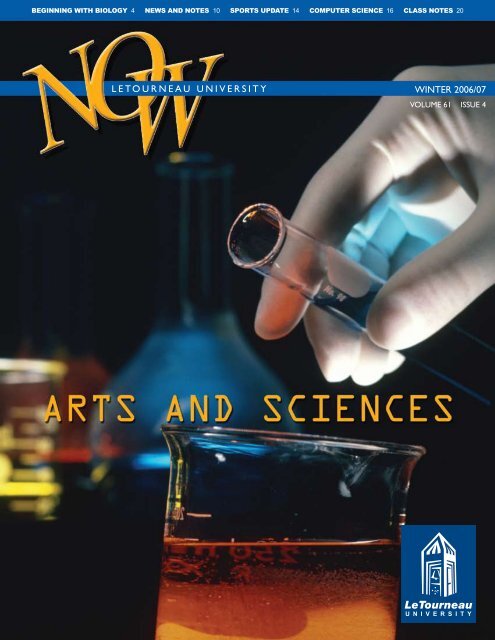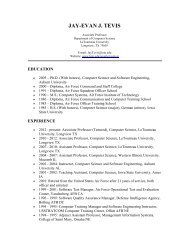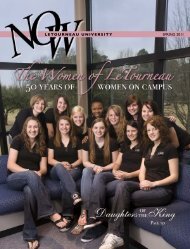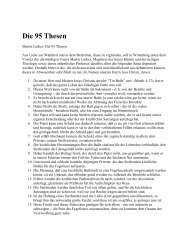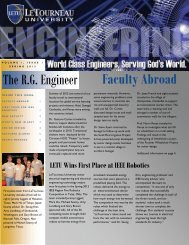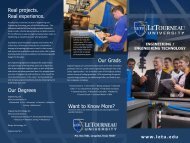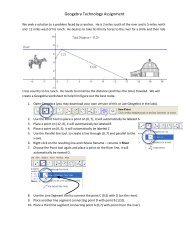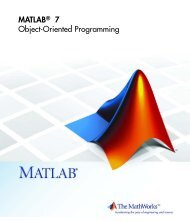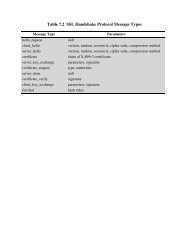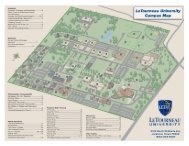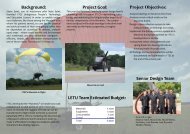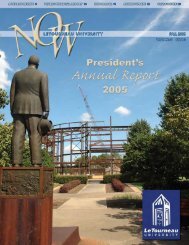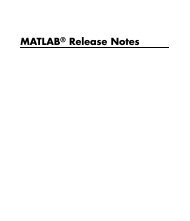WINTER 2006/07 LETOURNEAU UNIVERSITY
WINTER 2006/07 LETOURNEAU UNIVERSITY
WINTER 2006/07 LETOURNEAU UNIVERSITY
- No tags were found...
Create successful ePaper yourself
Turn your PDF publications into a flip-book with our unique Google optimized e-Paper software.
BEGINNING WITH BIOLOGY 4 NEWS AND NOTES 10 SPORTS UPDATE 14 COMPUTER SCIENCE 16 CLASS NOTES 20L E T O U R N E A U U N I V E R S I T Y<strong>WINTER</strong> <strong>2006</strong>/<strong>07</strong>VOLUME 61 ISSUE 4
A Message From The PresidentDR. ALVIN O. AUSTINPresidentLeTourneau University’s School of Arts and Sciences has neverbeen as strong as it is today. Arts and sciences curricular concentrationsat LETU include biblical studies, Christian ministry, computerscience, English, history-political science, mathematics, thenatural sciences such as biology, chemistry and physics, as well asSpanish and cross-cultural studies. From our excellent faculty and state-of-theartfacilities to our experiential learning style and low student-to-faculty ratio, ourcommitment to the arts and sciences is showing, and our reputation for excellenceis growing.For example, in the past decade, three out of four of our students who appliedto medical school were accepted. Several recent graduates have told us theyappreciate the firm educational foundation they gained at LeTourneau University.These graduates have been prepared to become leaders in their fields asthey pursue God’s calling on their lives.Classes in the arts and sciences touch the lives of every student. Core coursesin biblical studies, natural sciences, English, speech, history, political scienceand mathematics are an integral part of a well-rounded education. These sub-jects are building blocks for other majors. For example, our engineering majors benefit from our strong course workin mathematics and the sciences. Our computer science majors benefit from strong English and speech communicationcourses. Our international business majors benefit from strong language and history/political science courses.The sciences at LeTourneau University are based on our Christian worldview that God created, and sustains, theuniverse. We believe the study of science brings us closer to, not farther from, a deeper knowledge of God.In our science laboratories we have updated not only the quality of our equipment, but the quantity of equipment.That gives our students more “hands-on” opportunities to learn and prepare for further study. Instead of having sixmicroscopes in a lab, we have 30. Instead of our professors preparing the gels for their students’ experiments, thestudents prepare their own, enabling them to be involved in their experiments from the very beginning.Our equipment is as good or better than that found in state schools, but with our smaller class counts, our facultymembers are better able to ensure quality faculty-to-student interaction. We also have several undergraduatestudents who participate with their instructors in research projects, and some students have already had their workpublished. Other universities reserve that level of faculty-to-student interaction for graduate students.We are blessed to have the leadership of our arts and sciences dean, Dr. Amiel Jarstfer, and our many excellentfaculty members who continuously review and adapt our programs with new offerings to meet the needs of the 21stcentury. Recently, we launched a new degree in digital writing that combines English with computer science. Wealso recently launched new concentrations for our Christian ministry degree that blend management courses withbiblical understanding.The partnership between our computer science program and corporations like IBM gives our students the benefit ofjob experience while still in college, and often opens doors for employment after they graduate.These new programs are possible through our strength in teaching the arts and sciences, defining a LeTourneauUniversity education that blends faith with ingenuity. •2 DR. AUSTIN NOW<strong>LETOURNEAU</strong> <strong>UNIVERSITY</strong> <strong>WINTER</strong> <strong>2006</strong>/<strong>07</strong>
NO WL E T O U R N E A U U N I V E R S I T YALVIN O. AUSTIN, Ph.D. PUBLISHERJANET RAGLAND EDITOR IN CHIEFKRIS ERICKSON WRITER / EDITORTOM BARNARD CREATIVE DIRECTOR / GRAPHIC DESIGNERKENDALL HARPER CLASS NOTESNIEMAN PRINTING PRINTINGphil@niemanprinting.comPaul AbbottDr. Alvin O. AustinSheila M. BaileyPatrick A. BertscheWm. Delbert BrightDr. Joel Carpenter IV *Dr. O. J. “Jay” ChastainDr. Richard C. ChewningMike ChildressGary CrawfordJeffrey W. DancerH. D. (Doug) Douglas, Jr.Dr. Paul E. GlaskeDr. Kenneth L. HallDr. Billy J. Harris *Don HarrisonCalvin E. Howe *L. V. “Bud” McGuireDr. Janet McNicholasBoard of TrusteesNancy MendezDr. Larry MercerMarta E. Montenegro **Paul MontgomeryKenneth MooreEarl Roberts, Jr.John SolheimBilly SpainMajor General B. Fred Starr *Merle StoltzfusDr. David R. TreviñoWayne TrullSteve VoelzkeMary S. WhelchelDonald H. Wolgemuth ** Emeritus** Alumni RepresentativeContents4 Beginning With Biology8 Mexican Exchange12 Educating With a Global Perspective13 Calculating Success14 Sports Update15 A Legend Among Us16 Computer Science Paves The Way18 Business Education Helps Homeless19 Alumni Update / Class NotesCONTACT INFORMATION:PHONE: 903-233-3000WEB: www.letu.eduADMISSIONS:PHONE: 903-233-3400TOLL FREE: 800-759-8811AdministrationDr. Alvin O. Austin, PresidentLinda H. Fitzhugh, V.P. for Enrollment ServicesDr. Robert W. Hudson, V.P. for Academic AffairsJim Hughey, V.P. for University AdvancementDr. William R. McDowell, V.P. for Business and AdministrationMarila D. Palmer, V.P. for Executive Affairs and PlanningDouglas A. Wilcoxson, V.P. for Student AffairsADULT AND GRADUATEDEGREE PROGRAMS:PHONE: 903-233-3250TOLL FREE: 800-388-5327ADVANCEMENT DEPARTMENT:PHONE: 903-233-3810TOLL FREE: 800-259-LETUALUMNI OFFICE:PHONE: 903-233-3803E-MAIL: alumni@letu.eduFAITH BRINGS US TOGETHER.INGENUITY SETS US APART.23 Friends of LeTourneau University“BEHOLD, NOW IS THE ACCEPTABLE TIME; BEHOLDNOW IS THE DAY OF OUR SALVATION.” II Cor. 6:2LeTourneau University is an interdenominational Christian university located in Longview, Texas,offering academic majors in the aeronautical sciences, education, engineering, the humanities and sciences.LeTourneau University also offers business degrees and teacher certification programs at five educationalcenters around Texas in Austin, Bedford, Dallas, Houston and Tyler.LeTourneau University’s “NOW” magazine welcomes letters from readers. Letters must be signed, addressissues or events raised in the magazine and may not exceed 250 words. All letters may be edited for lengthor clarity. Any letters deemed potentially libelous will not be published. Opinions expressed in letters in the“NOW” magazine do not necessarily reflect those of LeTourneau University.“NOW” (USPS #3<strong>07</strong>-200) is published four times per year by LeTourneau University, 2100South Mobberly, Longview, Texas 756<strong>07</strong> • Sent free upon request to Editor, P.O. Box 8001,Longview, Texas 756<strong>07</strong>. • Periodical postage paid at Longview, Texas, and additionalmailing offices. • Postmaster: Send address changes to: NOW, P.O. Box 8001, Longview,Texas 756<strong>07</strong>
Beginning with BiologyWritten by Kris EricksonMany scientists believe Christianity has no place in the laboratory, or the classroom. AlumnaSabrina Shandley and others would disagree. Through Shandley’s work and study in thefield of immunology, she sees the conflict between science and faith daily. She is just one ofthe many LETU biology alumni who are now influencing their world for Christ.Many of our young biology graduates go on to achieve higher levels of education, takingwith them a strong foundation in the sciences and a commitment to Christ. For Shandley, the laboratories of theUnited States are just as much a mission field as the jungles of Africa. It all began with biology.Sabrina ShandleyLETU Degree: 2002 Bachelor of Science in biologyNow at: The University of Texas Health Science Centerat San AntonioDegree sought: Doctor of Philosophy in Immunology“Without a doubt, a believer sees sciencedifferently than a non-believer. Where Isee a beautiful, elegant design, they wouldsee a puzzle or a sequence of evolutionaryevents leading to an end process.”—Sabrina Shandley“It is very difficult to be a scientist and be a Christian,but at LeTourneau the two coexist,” Shandleysaid. “In my experience, the scientific communityviews God as a child’s imaginary friend. Meaning,science sees believers as children, less knowledgeable,naive, even gullible, and God is their imaginaryfriend. This attitude, of course, is not necessary to bea good scientist. Every Christian who is a scientistmust reconcile this to their own satisfaction. Withouta doubt, a believer sees science differently thana non-believer. Where I see a beautiful, elegantdesign, they would see a puzzle or a sequence ofevolutionary events leading to an end process. Theco-existence of science and Christianity is truly specialat LeTourneau.”Sabrina Shandley is researching the autoimmunedisease, myasthenia gravis, as she works towardgraduation. “Traditionally, when studying an autoimmunedisease, researchers focus on the immunesystem, how it has gone wrong and the pathology itcauses. In the lab I am working in, we study how amuscle contributes to its own fate during myastheniagravis. The interaction between muscle and autoimmunecells is the focus of our lab’s work,” Shandleysaid.As a student at LETU, Shandley developed a passionand drive to teach science. “Dr. Jarstfer gave methe opportunity to be a lab assistant for three years,”Shandley said. It was through this experience sherealized her love of teaching and appreciation forresearch. At LETU, she also developed a Christianworldview regarding science.<strong>LETOURNEAU</strong> <strong>UNIVERSITY</strong> <strong>WINTER</strong> <strong>2006</strong>/<strong>07</strong>
Shannon ToewsLETU Degree: <strong>2006</strong> Bachelor of Science in biologyNow at: The University of Texas Health ScienceCenter at San AntonioDegree sought: Doctor of MedicineShannon Toews is a first-year medical student.“In the anatomy lab, we have a practical testwhere the professor will pin or put string around acertain structure on our cadavers, and we have toname it. We rotate stations at a buzzer. I felt I had ahead start because my biology lab tests were exactlylike that at LETU,” Toews said.While at LETU, Toews enjoyed the intellectualdebates hosted by the science department discussingthe history of the earth and evolution. She also feltcared for by her professors. “I never left Dr. Jarstfer’soffice without him praying for me and my future,” shesaid.After dissecting sharks and cats at LETU, Toewswas ready to dissect human cadavers in medicalschool. She said her favorite dissections were theheart and lungs, “The lungs feel so cool... like acombination of a sponge and bubble wrap with supertiny bubbles. It’s hard to believe that it has the surfacearea of a tennis court!”Toews misses LETU’s unique atmosphere. “I leftsome of my best friends when I graduated. I miss randomfights with roommates with marshmallow guns,sliding down the berm in the rain, playing soccer withmy team, water balloons through my window at 2am... the little things.”Maggie SleighLETU Degree: <strong>2006</strong> Bachelor of Science in biologyStudying through: Creighton University’s School ofPharmacy and Health ProfessionsDegree sought: Doctor of PharmacyMaggie Sleigh is a first-year pharmacy student.“If I had to do it over again, I would go to LETU.I am a better person because of it,” Sleigh said. “Myspiritual education and biblical knowledge equippedme to be strong in my faith.”On entering graduate school, Sleigh said she wasready. “When I took the PCAT [an admissions test forpharmacy school], I had seen everything on the test.I was really prepared. I am ahead in my classes, andmy test scores have been above average,” she said.Sleigh said providing pharmaceutical care is notjust about filling prescriptions. “It’s also about relationshipswith customers, keeping up with meds andhow consistently the patient is taking their meds,” shesaid.Sleigh said pharmacology offers a great opportunityto build relationships, but said it is the relationshipsshe built with her LETU science professors that havehelped keep her going in graduate school.“The profs in the science department continue toencourage me,” Sleigh said. “I know they are prayingfor me. When I feel all alone in this secular environment,it’s good to have the encouragement of peoplewho care about me and support me.”NOW BIOLOGY 5
Kirsten GrimmLETU Degree: <strong>2006</strong> Bachelor of Science in biologyand chemistry minorNow at: Emory University’s Rollins School of PublicHealth, Atlanta, Ga.Degree sought: Master of Public Health in GlobalEpidemiologyKirsten Grimm is a research assistant in the influenzalabs at the Center for Disease Control (CDC).“Originally, I wanted to do mission work in sanitationeducation or nutrition. My two LETU mission tripsto Estonia in 2004 and 2005 really got me thinkingmore about missions,” said Grimm. She considers heryears at LETU to be the best three years of her lifebecause of the opportunities she had to build relationshipsand grow spiritually and academically. “At LETUI was able to grow and deepen my spiritual walk withthe Lord. I was equipped to stand strong and not beinfluenced by what other people think.“The Lord used those years to shape me into theperson I am, and looking back, it is definitely whereHe wanted me,” she said.Grimm said the quality academic foundation shereceived at LETU helped prepare her for graduateschool. “My LETU professors gave me personal attention.I know that they really care. Dr. Hood challengedme to think, and to know why I believe what Ibelieve. My grad school classes are hard, but I wasprepared. It’s just the next step,” she said.Jeannie ThompsonLETU Degree: 2004 Bachelor of Science in biologyGraduate Degree obtained: <strong>2006</strong> Master of PublicHealth with a concentration in epidemiology, Universityof Oklahoma Health Sciences Center, OklahomaCity, Okla.Jeannie Thompson was a graduate researchassistant on a longitudinal adolescent developmentresearch study in the College of Public Health at OU.As a part of her graduate study, Thompson workedwith the Oklahoma State Department of Healthanalyzing data for several non-reportable parasiticdiseases occurring in Oklahoma. She is currentlyteaching a statistics course as an adjunct professor atOklahoma City Community College.“My experience gave me a solid foundation,”Lindsey BrownLETU Degree: 2005 Bachelor of Science in biologywith a research concentrationNow at: University of Iowa, Iowa City, IowaDegree sought: Doctor of Philosophy in BiologicalSciences with an emphasis in cellular developmentAs Lindsey Brown continues her studies in thefield of science, she is thankful for her preparationat LeTourneau University. “My biology classesat LETU were taught from a biblical worldviewthat gave God credit for His creation. It is sohelpful to have that grounding when graduateschool tries as hard as possible to indoctrinatestudents to a secular humanistic worldview,” shesaid.“I believe that as a Christian and a scientist, Ihave a distinct advantage over my colleagues,”Brown said. “God is a God of order, not chanceand chaos, so studying His creation is studyinghow He orders and patterns.“LETU provided me an environment in whichI was able to grow both spiritually and academically.It prepared me to enter the workforce asan adult,” Brown said. “I learned so much aboutmy field, life and faith from my professors. . . Itgrounded me in the truth, which is so importantfor young adults who are then living and workingin a secular environment.”Thompson said of her hands-on, undergraduateeducation at LETU. “I have a well-roundededucation, and I am not only prepared withknowledge, but with life skills.”Thompson said LETU’s caring and encouragingprofessors made an impact on her. “They notonly spoke to us about living a life for Christ, butthey modeled it in their everyday lives,” she said.“In the science field there are so many peoplewho attribute everything to evolution and notto God’s design. . . The majority of my classmatesand coworkers do not have a personalrelationship with Christ,” Thompson said. Shesaid her Christian worldview influences peoplearound her. “I am asked about why I act the wayI do, and why I believe what I do,” she said.<strong>LETOURNEAU</strong> <strong>UNIVERSITY</strong> <strong>WINTER</strong> <strong>2006</strong>/<strong>07</strong>
<strong>LETOURNEAU</strong> <strong>UNIVERSITY</strong> <strong>WINTER</strong> <strong>2006</strong>/<strong>07</strong>Written by Jacki Sobota
Acathedral’s steeple could be seen frommy bed, a large cross reaching toward themorning sky. Before me: Puebla, Mexico.For two weeks, about 20 students and Itraveled from LeTourneau University toMexico to study the Spanish language with Sr. ArturoMorales, our Spanish professor, and his family. While inMexico I tasted a new culture and saw more of God’sbeauty in this world around me. I would return to Americawith a deep sense of longing for more of Mexico, itshistory and its people.Our hotel had been converted from an ancient monastery,retaining the essence of bygone times. Stonesteps wound up to the rooms and further up to the rooftop.From the roof, I could see the beautiful city, full ofcathedrals, a view of endless rooftops, hanging flowersand an ancient Aztec sun on the horizon. Leaning over,I could see the narrow streets below, lined with smalltiendas selling everything from Mexican candy to jewelry.So many people were walking to unknown destinations.Cars squealed as they rounded corners, barely missingtourists like me.In the mornings following breakfasts of huevosrancheros, fresh tropical fruit, coffee, toast and Frenchtoast, Sr. Morales held class for the intermediate andadvanced students. For a few hours, we would discussbasic grammar, vocabulary and foundational languageconcepts. Lunch and dinner were elaborate, with deliciouscuisine of traditional Mexico. For example, theygave three to four choices for appetizer, soup, entree,and dessert: enchiladas, tostadas, chicken and beefdishes, the authentic molé, and ice cream or pastries.Following lunch in the afternoons, we were assignedto guides, acompañantes, who lived in Puebla. One wasa retired bull fighter. Another was a medical doctor. Anotherwas a young college student. Every afternoon theyshowed us the city and practiced speaking Spanish withus. I walked the streets with my acompañante, amazedat the sights. The peddlers on the streets had carts fullof pineapples and oranges. One man was squeezingthe oranges and selling the juice. The people were allso friendly, with such ease and peace in their smiles.Little children with wide, innocent, brown eyes wouldapproach my side, eager to sell me their dulces, vestidosand ropa. They would always smile at me and gigglewhen I struggled to imitate their words in Spanish. I canonly imagine how silly I sounded.Some afternoons, we visited cathedrals in the area,including the Cathedral of Puebla and the Cathedral ofSan Francisco of Acatepec. As a student of history, I wasimpressed by the endless details, the religious paintings,the gold trim and the severe statues of Mary, the saintsand Christ. Once, when we visited a cathedral duringMass, I remember a woman kneeling before Mary, placingwhite flowers and candles at the statue’s feet.After many hours of study and taking our exams,my friends and I would venture out to explore. Oncewe came to a special street called Calle del Parian. Itwas full of native handcrafts, dresses, jewelry, leather,ceramic plates and cups. My desire to learn more Spanishvocabulary grew daily as I grew more confident inmy bargaining skills. I became eager to speak with thepeople. My favorite authentic Mexican candies werefound on a street called La Dulcería, which was linedwith candy stores. Some mornings, we walked to thecoffee shops in the square of the city, and sat in patiochairs, watching people walk by.One night, we saw an authentic Mexican bullfight.There was so much blood, I felt like I was in ancienttimes. While the blood and death of the bull were difficultfor me to watch, I realized the culture of Mexicoruns deep with traditions like bullfighting. So with thisperspective, I was honored to have witnessed such aprofound symbol of Mexico’s customs.The Teotihuacán ruins of the Aztecs and Cholulawere breathtaking sites we visited on the weekends.Rising to the sky, the temples had no need for translation.Long before the Spanish influence, they were here.The long-lost native tongue of the Aztecs still lives andbreathes in the Spanish language today.One Sunday, we all went to a Baptist church in Puebla.It was small, yet full of joyful believers praising Godin Spanish. I was astonished to realize that I understoodmost of the sermon and songs throughout the service.Because Spanish was being spoken to me on a dailybasis and my mind was constantly trying to translate andspeak it, I realized how much my Spanish fluency hadprogressed. In celebration of Mother’s Day, the sermonwas about Mary, taken from Luke 1:26-38. The verse,“Nothing is impossible with God,” translates “Nada hayimposible para Dios.” This verse proved to be so appropriatefor my time in Mexico. Those words echo in myheart in both languages. We are the Lord’s servants andhave no reason to learn a language for prestige or for agrade, but for God alone, to share His love with others.In even greater detail, Professor Morales assigned usto read and translate First, Second and Third John inSpanish. This was a wonderful assignment, reading andmemorizing the Word in another language, savoring thebeauty of this Romance language.I feel as if I grew in wisdom and understanding inthose two weeks. I enjoyed listening and speaking, evenbartering in Spanish with merchants for a homemadewhite dress. I expanded my experiences by tasting lambfor the first time, beholding the wonders of the Aztecpyramids and growing daily in knowledge and love for aculture so near to my home. •Jacki Sobota is a junior English major from Conifer, Colo. Shestudied Spanish in Puebla, Mexico, as part of a study-abroadprogram offered by LETU.NOW MEXICO 9
News and NotesDR. AUSTIN RECEIVESHENRY O. GOSSETT AWARDLeTourneau UniversityPresident Dr. Alvin O.Austin was namedthe 20<strong>07</strong> Henry O.Gossett Award winnerat the university’sannual communitybanquet Nov. 4. TheHenry O. Gossett, Jr.Community Partner Award is named in honorof Henry Gossett for longtime service to theuniversity through the President’s AdvisoryCouncil.PACT INTERN OF THE YEARLaurie Taylor, a graduate of LETU’sPostbaccalaureate Accelerated Certificationfor Teachers (PACT) program in Houston wasnamed Intern of the Year for early childhoodthrough 4th grade at the annual conferenceof the Consortium for State Organizations ofTexas Teacher Educators. Taylor teaches atRustic Oak Elementary School in the PearlandIndependent School District.PAUL ABBOTT NAMEDALUMNUS OF THE YEARLeTourneau University alumnus Paul Abbottwas honored as the Alumnus of the Year at theuniversity’s annual homecoming banquet Oct.14 in Longview, Texas. Abbott graduated fromLeTourneau College in 1971 with a Bachelorof Science in Aviation Technology. He and hiswife, Betty, own and operate Covington Aircraft,a world leader in aircraft engine overhaul andrepair, based in Okmulgee, Okla. Abbott hasprovided outstanding support to LeTourneauUniversity, currently serving on the Board ofTrustees as well as the Aeronautical ScienceAdvisory Council. Through his support andpromotion, the university completed the MartinDonner Engine Test Facility in the spring of<strong>2006</strong> at its Longview campus in memory of hisformer college roommate, who later became abeloved aeronautical science faculty member.LETU HOSTS FIRST MISSIONAVIATION CONFERENCEMore than two dozen representatives frommissionary aviation organizations from acrossthe globe met at LeTourneau University Nov.16 and 17 for the university’s first missionaviation training summit to discuss changes inmissionary aviation brought on by technology.The increased use of turbine-poweredairplanes and the introduction of technicallyadvanced aircraft, like the Quest Kodiak, willrequire a new approach to pilot and techniciantraining for missions. Fred Ritchey, dean ofaeronautical science, said LETU is in a uniqueposition to partner with organizations to explorewhat the new approach to training should looklike, for both traditional students interestedin mission aviation, and for current missionaviation staff needing additional training.Organizations including JAARS, MissionAviation Fellowship, Samaritan’s Purse, AIMAir and New Tribes joined representatives fromDynamic Aviation, Covington Aircraft Enginesand Quest Aircraft at the summit.<strong>LETOURNEAU</strong> <strong>UNIVERSITY</strong> MOURNS DEATH OF BUILDING’S NAMESAKELeTourneau University mourned the loss of trustee emeritus and friend Shelby Elliot Belcher, Jr., 90, who died at his home in Brent, Ala. Dec. 14.A longtime trustee and supporter of the university, Belcher is the namesake of the university’s newest building, the S. E. Belcher Jr. Chapel andPerformance Center, slated to open in the spring. His influence is seen throughout the Longview campus, having played a significant role in every majorbuilding project in the last 20 years. The university’s bell tower, which anchors the campus mall, is named in memory of his first wife and former highschool sweetheart, Jeannette Steele Belcher, who died in 1991.“Elliot Belcher loved LeTourneau University and believed in the value of Christian education,” said LeTourneau University President Dr. Alvin O. Austin,who spoke at Belcher’s funeral service in Alabama. “A humble and caring man who loved the Lord, he gave the lead gift of $5 million to the university forour new chapel and performance center knowing he might never have the opportunity to sit in it. I am honored by the family to be asked to be a part ofhis funeral service.”<strong>LETOURNEAU</strong> <strong>UNIVERSITY</strong> <strong>WINTER</strong> <strong>2006</strong>/<strong>07</strong>
<strong>LETOURNEAU</strong> <strong>UNIVERSITY</strong> NOW MAGAZINEWINS KATIE AWARD FOR EXCELLENCELeTourneau University’s NOW magazine was named best magazine amongcorporate and nonprofit magazines by the Press Club of Dallas at the 48thannual Katie Awards for journalism excellence Nov. 18. The Katie Awardsrecognize excellence in print, broadcast media and mass communication ina five-state area including Arkansas, Louisiana, New Mexico, Oklahoma andTexas. The magazine was a finalist for the award in 2005.LEGS PROJECT ATTRACTSNATIONAL MEDIA COVERAGEThe Nov. 17 issue of The Chronicle of HigherEducation featured a full-page story on the 11LeTourneau University engineering studentswho are designing a low-cost prosthetic legfor amputees in under-developed nations. TheChronicle of Higher Education is the nation’soldest and largest trade journal for collegeand university educators and administrators.The publication has a total readership of morethan 400,000 worldwide. Chronicle writer andSouthwest Bureau Chief Katherine Mangantraveled to Longview in October to report onLeTourneau’s LEGS Project. LEGS standsfor LeTourneau University Engineering GlobalSolutions. To read more about the LEGSprogram, go to www.legsresearch.org.LETU RESEARCH CONFIRMSBUBBLE FUSION RESEARCHLeTourneau University physics professorEdward R. “Ted” Forringer, Ph.D., andsenior David Robbins presented two papersconfirming the existence of fusion in collapsingbubbles at the American Nuclear Society (ANS)winter conference in Albuquerque, N. M. Inaddition, the two also co-authored a paper onbubble fusion with sophomore Jonathan Martinthat has been peer-reviewed and acceptedfor publication in Transactions, a publicationof the American Nuclear Society. A secondpaper with Robbins as lead author, alongwith Forringer and Martin, is being reviewedfor publication. Forringer says fusion holdspromise for clean, cheap and abundant “green”energy.CCCU HONORS DR. AUSTINLeTourneau University President Dr. AlvinO. “Bud” Austin was recently honored by theCouncil for Christian Colleges and Universities(CCCU). President Austin received a certificateof appreciation for his service to the CCCU andfor his contributions to higher education.FLIGHT TEAM WINS FIRST PLACE AT NIFA COMPETITIONLeTourneau University’s aeronautical science team won first place overall in the NationalIntercollegiate Flying Association’s <strong>2006</strong> Region IV SAFECON competition at the University ofLouisiana at Monroe, and qualified to attend the national NIFA competition in Columbus, Ohio, May7-11. The LETU “Sting” Precision Flight Team won first place in ground events and third place inthe flying events, with scores totaling first place overall and 116 points ahead of the second placeteam. They competed against teams from eight other universities in Texas, Louisiana, Mississippiand Missouri. Brad Wooden, team coach, flight instructor and faculty adviser, coaches 13 flightstudents on the LETU Sting Precision Flight team. Several LETU students took first place trophies inindividual events.CCCU President Paul Corts and Chairmanof the CCCU Board of Directors David S.Dockery expressed appreciation to Dr. Austinfor his service, not only to the CCCU, but to theSouthern Association of Colleges and Schoolsfor which Austin served on the executivecouncil of the Commission on Colleges.The plaque reads, “We commend Dr. Austinfor his remarkable accomplishments atLeTourneau University where his leadershiphas transformed the university over the pasttwo decades.” •NOW WHERE NEWS & ARE NOTES THEY 11
Global Perspective on EducationWritten by Kris EricksonWhile teaching overseas, Chair of the Historyand Political Science Department Dr. PaulKubricht found that more than ever, the bestjob opportunities overseas will go to graduateswith multilingual abilities.Kubricht took a one-semester sabbatical, from January toMay of <strong>2006</strong>, to teach classes at the International Universityof Vienna, Austria. He taught two undergraduate coursesin Contemporary U.S. Foreign Policy (WWI to present) andHistory of Political Thought, and one graduate course inInternational Relations.His students came from Eastern Europe, Germany,Austria, Kazakhstan, Russia, the Middle East and Africa andmost spoke several languages. For many of these students,education was the only way to escape impoverished conditionsor get ahead, Kubricht said.“They had no problem with the language barrier,” saidKubricht, who taught in English. “They were very interestedin an American university degree and learning American languagepatterns. Many of them already know one or two locallanguages. The majority are trilingual, which puts them in avery good position for international employment.”While in Austria, it became clear to Kubricht that theseinternational students will have an obvious advantage overhis students at LeTourneau in the future international jobmarket.“The challenge for LeTourneau University students interestedin international affairs or business is the commitmentto being bilingual or trilingual,” Kubricht said. A student onlyfluent in English may compete againsttrilingual students for internationalpositions. To be professionally competitive,American students musthave the commitment to becomemultilingual.To assist LETU students ingaining the necessary languageskills, Kubricht said studentsshould not only study foreign languages but live in anotherculture for three to six months. “I want students to digdeeper in their understanding of different languages andcultures,” he said. “I want them to ask themselves, who arethese people? How do they think? It’s important that ourstudents learn the culture.”Currently, Kubricht encourages students to take advantageof Best Semester, the Council for Christian Colleges &Universities’ (CCCU) off-campus study program. Studentscan apply to study for one semester in China, Latin America,the Middle East, England, Russia, Australia, or Uganda, takingclasses while being immersed in that country’s culture.Students take classes such as African Traditional Religions,Islam and Christianity in Contemporary Uganda, Conflictand Change in the Middle East, Russian, Arabic, Spanish orChinese History.LETU alumnus Christopher Schwan studied in LatinAmerica in the Best Semester program and said his culturalemersion reinforced his sense that Americans shouldn’t justcontinue to live comfortably in the United States and forgetabout the rest of the world. He believes every LETU studentshould study abroad.“It broadens students’ worldviews and shows them firsthandwhat it’s like to not be an American,” Schwan said. “Itexposes students to a more realistic worldview.”LeTourneau University is looking at programs that betterprepare students to compete on an international level.“There are a lot of programs out there,we just need to find the right one forLeTourneau,” he said.“Our students are competingwith an educated world for internationaljobs,” he said. “We mustthink creatively about the best wayto provide this global education.It requires a shift in Americanthinking.” •<strong>LETOURNEAU</strong> <strong>UNIVERSITY</strong> <strong>WINTER</strong> <strong>2006</strong>/<strong>07</strong>
CalculatingSuccessWritten by Janet RaglandLeTourneau University is known as a top engineeringschool. Students majoring in engineering must takerigorous mathematics in high school to be preparedfor the rigors of Calculus I during their first semester.Some have not. So what does the university do whenincoming engineering freshmen haven’t received the necessarymath preparation?LETU math professor Lois Knouse has found an answerthat works. She designed an intensive, acceleratedmath program specifically for engineering majors that offersPrecalculus and Calculus I in sequence during five-day-aweekclasses during the first fall semester. The course isdesigned for students scoring between 550 and 630 on theirSAT in math, or between 24 and 27 on their ACT in math.The course readies students for Calculus II in the springsemester.“Several years ago, we observed many of our prospectiveengineering and science majors were entering with adeficiency in mathematics,” Knouse said. “They were strugglingto successfully complete Calculus I in their first semester,causing them to be behind, not only for mathematics butfor their other courses that require it as a prerequisite.”For example, Calculus I is a prerequisite for Physics I,which is only offered in the spring. If students fail to enrollin Physics I during their spring semesters, they become ayear behind in physics. Once behind, it’s difficult to catch upsince Calculus II is a prerequisite for Statics and ElectricalCircuits I, which is usually taken during the third semester.“This was an unacceptable situation,” Knouse said. “Wedecided to try a different approach to prepare students forthese courses while still maintaining the course sequencesfor the different curricula involved.”Classes meet every weekday at 8 a.m. Content includesa review of Trigonometry and seven weeks of Precalculus,followed immediately by seven weeks of Calculus I. Homeworkis assigned every night.After the first two weeks of Precalculus, students aregiven a test. Those who fail are counseled to change intothe regular, semester-long, Precalculus class.When Knouse began offering this new program in fall of2004, Precalculus and Trigonometry (as separate classes)were required of freshmen lacking the higher math. Studentswho took Precalculus and Trigonometry did not receiveengineering math credit, only course credit. Then, in thespring of their freshman year, these students were ready forCalculus I, but were already behind a semester in math.Using this new program, by the end of their first semester,freshmen are prepared for Calculus II, putting them back onschedule.Results have been encouraging.Of the 33 students who began the program in fall 2004,26 completed Precalculus and 23 completed Calculus I. Ofthe 21 who enrolled in Calculus II in the spring, 18 successfullycompleted it. Most of those who did not succeedchanged majors. Success rates in fall 2005 and <strong>2006</strong> continueto show the program is working.Since the program began, 35 students have been readyfor Calculus III or Differential Equations by their third semestersand were on track for their engineering courses.“Several students have said they might not have successfullycompleted Calculus I and Calculus II without thereview of Precalculus,” Knouse said.Nathaniel Horton, a junior materials joining engineeringmajor from Tennessee, was in the first class in 2004.“It is a very good program,” he said. “Prior to coming toLETU, I had no calculus experience. I took five math coursesduring high school, just not calculus. Most of my mathcourses were focused in probability, statistics and advancedalgebra-based math.“I have seen this course’s benefits,” Horton said. “Ourcourse work in metals and physical chemistry behaviorinvolved a lot of partial differential calculus. After the initialcourse, I moved on and went successfully through CalculusIII and Differential Equations without the slightest trouble.” •NOW MATH PROGRAM 13
Sports UpdateWritten by Shane Meling, Sports Information DirectorWhen student athletes arrived on campus in mid-August,there was a distinct air of anticipation for the upcomingfall athletic season. The anticipation turned into delightas men’s soccer, women’s soccer and volleyball combinedfor one of the best athletic falls in school history.Men’s SoccerHead Coach Tom Wait led the YellowJackets to a 12-5-2 season record; the best since the team went 14-5-1in 1998. The Jackets also won the most American SouthwestConference games in school history, but were left outof the conference playoffs due to a tie-breaker.Despite the disappointment, the year has been a greatsuccess.For the season, the Jackets outscored their opponents41-22. Goalkeeper, Willie Cloyd, set a school record, 1.13goals against average. Ryan Potter and Daniel Iya led theJackets scoring for the year as Potter finished with eightgoals and 10 assists and Iya had 12 goals and one assist.Women’s SoccerHead Coach Troy Edwards led the LadyJackets to thebest season in school history with a 10-7-2 regular seasonand an 8-4-1 record in the ASC. The team advanced tothe conference playoffs for the second year in a row.The team was led by its trio of outstanding goal scorers:senior Erica Sudeck, sophomore Amanda Norton andfreshman Angie Muszynski. Sudeck led the team with anLETU single season record in goals (19), assists (8) andpoints (46). She concluded her career as the most decoratedplayer in the program’s history.The team finished out the season on the road with a6-3 victory at University of the Ozarks and a 3-0 loss atUT-Dallas.VolleyballThe volleyball team stormed out of the gates this seasonwinning five of its first six matches, including a seasonhigh four-match winning streak. The LadyJackets finishedthe season 10-19 for their best record since going 14-21 in1997. They also picked up four American Southwest Conferencevictories—the most since the 1998 season. TheLadyJackets missed the playoffs by one game, making thisyear their best ASC finish to date.Two LadyJackets eclipsed the 1,000-career-digs markfor the first time in the school’s history. Senior JulianaMetcalf concluded a brilliant career with 1,061 digs and644 kills. Junior Bethany Suderman was close behindwith 1,036 digs from her libero position. Suderman led theteam with 3.92 digs per game in <strong>2006</strong>.Sophomore setter Abigail Hews had another recordsettingseason with 961 digs. She had the top two singleseasonassist marks in school history. She was namedthe ASC East Division Setter of the Week twice during theseason and was second on the team behind Sudermanwith 2.87 digs per game. •<strong>LETOURNEAU</strong> <strong>UNIVERSITY</strong> <strong>WINTER</strong> <strong>2006</strong>/<strong>07</strong>
A Legend Among UsMary Ann OtwellWritten by Janet RaglandAsmall sign outsideMary Ann Otwell’s officedoor in the SolheimRecreation andActivity Center reads,“Legend.” The four-time Hall of Famerdidn’t put it there. LeTourneau UniversityAthletic Director Duane Trogdongave her the nickname.“When I came and interviewed forthe Athletic Director’s job a few yearsago, I noticed her picture was all overthe gym for the national championshipsher women’s basketball teamshad won,” Trogdon said. “Everybodyelse just picked up on it from there.”While Otwell’s official titles includeassistant professor of kinesiology,assistant athletic director and seniorwoman administrator for athletics, it isreally “Legend” that fits her best.Otwell truly is a legend in women’sbasketball. She launched thewomen’s basketball program atPanola Junior College and led themto back-to-back national junior collegewomen’s basketball titles in 1977 and1978. From 1974-78, she compiled a102-40 record and was twice namedthe National Junior College AthleticAssociation National Coach of theYear.That record opened the door to asuccessful coaching career at StephenF. Austin State University whereOtwell assisted the renowned headcoach Sue Gunter before Otwell assumedthe head coaching positionherself, racking up a 61-29 record.At LeTourneau University shestarted the women’s basketballprogram in 1993, having come out ofretirement to build the program fromthe ground up. Within five years, shehad back-to-back National ChristianCollege Athletic Association (NCCAA)national championships: in 1996-97and 1997-98. When she retired fromcoaching after more than two decades,she had a record of over twowins for every loss, and she neverhad a losing season.But it wasn’t just the life herplayers played on the courts thatmattered to Otwell. She has alwaysinvested energy into the spiritual livesof all of her students and continues tolive her faith as an example.“I hope my students see in me areflection of Christ,” Otwell said. “Iknow I may be the only Bible theyread. You never really know whatthese kids are hearing, or whetherthey are in church or not, so in myclassroom devotions I think it’s importantthat they hear from me that sin issin. I speak boldly to them because Icare where they spend eternity.”Otwell grew up in Arkansas, livingon a farm and picking cotton afterschool. Though her family was poor,she had faith to see her dreams cometrue.Otwell attended Ouachita BaptistUniversity in Arkadelphia, Ark., andplayed basketball and tennis. She ledthe Tigerette basketball team to statechampionships during both seasonsshe played in 1961 and 1962. Shewas the team’s leading scorer andwas selected for All-State both years.Otwell was also named to the NationalWomen’s Basketball LeagueAll-Star team after the 1962 season.In tennis, Otwell won three consecutiveAIC singles titles, havingbeen a runner-up her freshman year.In doubles, she was an AIC championall four years. After earning herundergraduate degree from OBU,she later earned a Master of Sciencein Education with a concentrationin kinesiology from Arkansas StateUniversity.Otwell had already been inductedinto three athletic halls of fame whenher undergraduate alma mater askedto honor her with induction into theOBU Hall of Fame this past November.Otwell had been inducted into theNational Junior College Athletic Hallof Fame, the Panola Junior CollegeHall of Fame and the LeTourneauUniversity Hall of Fame.“When you look at her careerand her coaching in college, she isa legend,” Trogdon said. “If she wasa Division I coach in today’s cultureof women’s coaches, she would beat the top nationally. Very few haveachieved the record she has. Shehas been successful at every level.”•NOW LEGEND 15
Josh Bruning and Mark SmithAndrew SlomaComputer Science ProgramPaves Way To Big BlueWritten by Janet RaglandLeTourneau University computer science undergraduatesbegan researching software flawsfor IBM in 2002 as part of a cooperative agreementbetween the university and the computergiant. Students found design flaws in designatedsoftware by abusing it while they documented how itperformed under stress.“This partnership gave our students practical experiencein software verification techniques, which verifiesthat no matter what you do to the program, it will performexactly as the documentation says it will,” said computerscience professor Dr. Craig Varnell. “LeTourneau Universityis one of only two universities to have this kind ofpartnership with IBM.”Due to the excellent work of the LETU students, IBMhas expanded the program this semester to include studentsin software development for IBM’s i-Series operatingsystem.“This advancement gives our students the uniqueopportunity to do real-world development while still undergraduates,”Varnell said. “Two of our graduates who camethrough this program now work for IBM as fulltime employees.Several of our current students will do six-monthcooperative agreements at IBM in Rochester, Minn. Thisexperience makes our students extremely marketable aftergraduation.”Andrew Sloma, a 2002 computer science graduate, wasLETU’s first co-op student with IBM. He’s been working forIBM for nearly five years.“I started out as a tester for the SQL support on theserver, and moved into a development position shortlythereafter,” Sloma said. “I am currently working as asystem’s programmer for DB2 on the IBM System i server.The job is unique in the sense that I am developing operatingsystem code. With the consolidation of operatingsystems across the industry over the last decade, I look atthis as a pretty cool position.”Sloma is now managing the partnership between IBMand his alma mater.“My experience at LeTourneau was very positive,” hesaid. “In many ways the field of computer science is verydynamic, and it requires universities to stay proactive inresponding to changes within the field. The LeTourneau– IBM relationship is a great example of how LeTourneauis striving to stay in-sync with the industry. It also providesmore than just technical know-how. It allows students toexperience problem solving in a ’real world’ environment.”Sloma said his small classes made interaction with professorsand students easy.“Classes that focused on teamwork projects preparedme for the team-oriented environment in which I nowwork,” Sloma said.Mark S. Smith is a <strong>2006</strong> graduate who also works atIBM in Rochester as a software engineer/developer. Heworked in the IBM project course for two semesters andsays IBM is a good first job out of school.“Most of what I do is a form of problem solving, and Ilove it,” he says.“IBM is a relaxed environment and invests a lot indeveloping new employees,” he says. “There is definitely<strong>LETOURNEAU</strong> <strong>UNIVERSITY</strong> <strong>WINTER</strong> <strong>2006</strong>/<strong>07</strong>
a form of culture shock after you leave the academic worldof LeTourneau. I’m still trying to get used to the idea ofstaying in the same place for a while and not changinghomes every semester.”Smith says the IBM internship stretched him.“There were a lot of technical terms we had never seenbefore and the students were required to divide the workand assign roles among themselves,” he said. “The projectrequired programming in a language I didn’t know (SQL)on a platform I had never heard of (AS/400). My teammateand I read through several ‘heavy’ books in a franticattempt to learn enough to get the job done. At the closeof the project, our ability to rapidly adapt to a new environmentand exceed the expectations left a positive impressionon our partners at IBM.“In the end, I got my first glimpse at what a professionin computer science might actually be like,” Smith said.“Real world experience is very valuable and can often behard to come by in a university atmosphere. The relationshipwith IBM provides the opportunity to merge the industrialworld with the academic world and allows students togain the experience employers are looking for.”Smith said his relationships with his professors made adifference.“Dr. Varnell often used a hands-off approach to theproject and allowed the students to organize it themselves.The success or failure of the project was in the hands ofthe students and this provided a more realistic experience.While on the project, I would often spend hours in Dr.Varnell’s office talking to him about the project and otherthings going on in my life at the time. I found the professorswere often open to their students and didn’t mindtaking time out of their day to help, or even just talk.“LeTourneau is not just about developing a career, butdeveloping individuals as well,” Smith said. “College isthat time in life when individuals form the opinions and idealswhich they will carry with them for the rest of their lives.LeTourneau is a community that takes an active interest innot just developing skills in a profession, but also developingwell-rounded people.”Josh Bruning, a junior computer science major fromStanton, Iowa, who plans to graduate in 2008 and enter agraduate school, is just completing a six-month co-op withIBM.“This is a very good job to have while in college...certainlywell beyond my expectations,” Bruning said. “My jobexperience as a co-op has included design and planning,implementation using programming and basic graphicdesign and deployment of the software to customers. Myschedule is very flexible...as long as I average 40 hours aweek, I can come and go as is convenient for me.”A National Merit Scholar, Bruning says he plans toreturn to IBM in Rochester during the summer on a threemonthco-op as a co-op/intern programmer.“Because of the partnership between LeTourneau andIBM, Dr. Varnell had established a correspondence withmy first manager,” Bruning said. “I was able to easilyenter the software industry because of my performance inschool and in spite of my lack of professional experience.IBM is a very well-known and respected company—somy experience here will be recognized. This experiencewill definitely help me to get a better job when I enter theworkforce.” •From The Admissions OfficeWritten by James Townsend, Director of AdmissionsThis fall, I realized just how much technology affects our students’ lives. I taught one section of Cornerstones of LifeLearning – a required course for all new freshmen at LETU. Through spending time with these students, it was clear thattechnology has a massive impact on their lives.Today, students consider an e-mail or a text message to be as personal as a phone call. For example, they send holidayand birthday greetings by text message, MySpace and Facebook.To reach these college-bound students, LETU Admissions is using the Web. Our site has several online resources forstudents and parents. Brand new is “the room,” our interactive college dorm room, and LETU “realities,” our online magazine.More admissions information is at www.letu.edu.Don’t worry, we haven’t thrown the phones away! Reach us at 800.759.8811 and 903.233.4300.We hope that you’ll share this with your friends, children, grandchildren and any other college-bound students you know.If they are interested in admission for the fall 20<strong>07</strong> semester, they should apply now! Financial aid awards begin March 1,20<strong>07</strong>.NOW COMPUTER SCI 17
MBA Classes Help The HomelessWritten By Janet RaglandStudents in Dr. MichaelDobbs’ MBA capstoneclasses at the Dallasand Bedford educationcenters of LeTourneauUniversity are getting some realworldexperience putting theirgraduate education to work, evenbefore they finish their degrees.Instead of using business model examplesand exercises from a book,the MBA students have done actualbusiness strategy assessments for afew Dallas-area charities, includingInterfaith Housing Coalition.IHC helps homeless childrenand their families establish stabilityand find affordable housing. Manyof these families are single motherswith small children who are fleeingabuse. Some live in their cars, havingbeen evicted from their apartmentsand homes.IHC provides apartments for 90days to help get women and theirchildren off the street. Budget andfinancial counseling is provided, asmany of these women are buriedDr. Michael Dobbsunder a mountain of debt. IHCvolunteers meet with clients weeklyand help them set goals, sharpen interviewingskills and write resumes.IHC helps the women find jobs,loans them clothes for interviewsand provides bus passes to get tojob interviews. If clients don’t work40 hours a week, they must spend40 hours a week looking for work.IHC’s goal is to get these familiesoff welfare and make them self-sufficient.Dobbs said he reviewed severalorganizations before choosing thisone for his MBA students to assess.“This is like their senior project,”Dobbs said. “The capstone class isthe last MBA class before studentssplit into their concentrations. In thisproject, our students can pull froma lot of different areas they havealready studied, such as accounting,management, organizationalbehavior and business strategy. It’sa hands-on, practical use of whatthey have already learned.”The MBA students assess froma purely economic standpoint thecosts to society of these familiesremaining homeless. Studentspresent the best, worst and likelycase scenarios that can includedrug addictions, prison and fostercare. Knowing the costs to housean inmate for a year, and how mucha child in foster care costs per year,helps the MBA students quantify thebenefits of IHC’s goals, Dobbs said.“Compared to a North Texas FoodBank that’s feeding 57,000 familiesa month, the 100 families a year thatInterfaith Housing Coalition helpsmight not seem as important, butwhen you consider the long-termeconomic effect of helping familiesbe self-supporting and stable, thenits impact is huge.“It came to millions of dollars ofeconomic impact,” Dobbs said. “InterfaithHousing Coalition could takethat data and use it in their fundraisingmaterials. We told them, ‘This isthe story you can tell, and here arethe numbers to back it up.’”IHC Executive Director LindaHall said the work the students didfor the nonprofit has made a tremendousimpact in showing a socialreturn on investment in a languagedonors understand.“We’ve used LeTourneau University’sassessment of our social returnon investment in every proposalwe’ve generated, and we quotetheir data in every tour we give,”Hall said. “We needed to be able toshow we are good stewards of ourmoney, and that we are making adifference and operating efficiently.LeTourneau’s outside verificationhelped us do that.”Dobbs was recently a nomineefor LeTourneau University’s prestigiousRobert H. Selby Award forexcellence in teaching.“I was very happy to be a Selbynominee and represent those of usout at the satellite campuses whoare doing some good work,” hesaid.Dobbs says it takes a lot of organizationand administration to makethese programs work, but it is worthit when the students receive practicallearning application and see thebenefits of their work.“We’re not going to Africa, butinto the inner city of Dallas whereour work is helping Interfaith HousingAuthority build a future for thehomeless,” Dobbs said. •<strong>LETOURNEAU</strong> <strong>UNIVERSITY</strong> <strong>WINTER</strong> <strong>2006</strong>/<strong>07</strong>
From the Alumni OfficeWritten by Allison Gardner, Director of Alumni and Parent RelationsLast spring the Alumni Association held bowl-a-thon events in Indianapolis, Ind., Minneapolis,Minn., Wichita, Kan., and Chicago, Ill., that each raised over $1,000 to fund a scholarship for astudent from each city to attend LeTourneau University in the fall of <strong>2006</strong>. A note from one of thescholarship recipients reads:“I came to LeTourneau expecting to receive a top-notch education to prepare me for my life ahead.There is no question that the education level here is superior. However, after spending even just afew weeks here, I found that I will acquire much more than just a quality education.The friendshipsthat I have formed with other students will, undoubtedly, be life long. These friends are true friends.They push me to grow closer to Christ and to go beyond my expectations and supposed limits.”Mark your calendars and help a student from your area to study at our wonderful alma mater. We willhold our 2nd Annual Midwest Scholarship Challenge on March 3 and March 10, 20<strong>07</strong>. You will receivea letter in the coming weeks with complete event information if you live in Indianapolis, Minneapolis,Wichita, Chicago or Longview. Alumni and friends do make a difference!HomecomingAlumni from across the decades celebrated on campus during Homecoming <strong>2006</strong> with a variety of 60th anniversary events.Check out some snapshots from the weekend and mark your calendar now for Homecoming 20<strong>07</strong>, October 26-27. Weare in the process of planning reunions for the following groups:• Dorm 4• WRH – Northwest and Northeast wings• Varsity Men’s and Women’s Soccer and Women’s VolleyballHomecoming 20<strong>07</strong> will be a special event for us as we welcome a new president to our alma mater. So phone your LETUbuddies and plan to be here!NOW ALUMNI 19
Class NotesMEMORIALSPaula (Hudson)Seaburn (’65) died Oct.4, <strong>2006</strong> in Clinton, Mo.She is survived by herhusband of 41 years,Gene Seaburn (’66),three daughters andseven grandchildren.Johnny Williams(’72 MABS) died Oct.8, <strong>2006</strong> after a longillness. Johnny wasthe vice chancellorfor administration andfinance at the Universityof Mississippi. Heis survived by his wife, Carolyn, and theirthree children.Russell J. Tatro (’78 RE) died June 1, <strong>2006</strong>in Burlington, Mass. He is survived by hiswife, Wendy, and two daughters.Cynthia Y. Carter (’03 BBA) died Oct. 18,<strong>2006</strong> as the result of a car wreck. She issurvived by her husband, Amani Carter, andher three children.Deise Hunt (’03ISEL) died Dec. 9,<strong>2006</strong>. Deise lived inGilmer, Texas, whereshe was an elementaryschool teacher.Deise is survived byher husband, Larry, and her six children.Glen R. Sharp (’04 BBA) died July 31,<strong>2006</strong> from a heart attack. Glen lived inKeller, Texas.BIRTHSPeter VanWieren (’97ME/WE) andhis wife, Tonnie,have a beautifulbaby girl.Elena Ruth was born Oct. 17, <strong>2006</strong>. TheVan Wieren family lives in Ypsilanti, Mich.,where Peter works as an engineer.Jason (’96 EE) and Holli Burnfield havefive daughters. Layla was born Sept. 5,<strong>2006</strong> and was welcomed home by Iona, 7,Isabel, 5, Emily, 4 and Holli Faith, 3. TheBurnfield family lives in Norman, Okla. Holliwrites music which they are recording. Jasonworks as an electrical engineer at TinkerAir Force Base.Paul (’00 ATFL) and AmyHildebrandt have a son.Samuel Musa was bornOct. 10, <strong>2006</strong>. Paul worksfor Dynamic Aviation and isbased in Kingston, Jamaica.Jason (’01 ASAE) and Jaime (Benge) (’00BUMK) Brewer have a daughter. MorganGrace was born Sept. 21, <strong>2006</strong>. She joinedbig brother, Dylan, 3. Proud grandmother isNina Benge (’02 BBM). The Brewers live inSulphur Springs, Texas, where Jason worksfor Legend Aircraft.Andrew (’01 ME) and Dacia Olson announcethe birth of Lydia Doris on June 29,<strong>2006</strong>. She joins big sister, Abigail, 2. TheOlson family lives in Champlin, Minn., whereAndrew is a project engineer at Medtronic.Kyle (’03 ME) and Clara (Edge) Danielson(’02 BUBS) announce the birth of Seth Michaelon July 4, <strong>2006</strong>. Kyle is an assistantsuperintendent with a residential constructioncompany. Clara is a stay-at-homemom. They live in Bellevue, Wash.Phillip (’06 ASFL)and Melissa Winnhave a secondchild, Colin Carter,born Sept. 26,<strong>2006</strong>. He joins bigbrother, Preston.MARRIAGESat Liteye Systems.Gordon Bullivant(’99 ME/WE) marriedAshley Engler June24, <strong>2006</strong> in Ferndale,Wash. Ashley is ateacher and Gordon isa mechanical engineerdesigning oil refineriesat VECO USA, Inc. inBellingham, Wash.Rob Lund (’96EE) marriedSarah BakerAug. 11, <strong>2006</strong>in ColoradoSprings, Colo.Sarah is ateacher andRob is an electricalengineerTiffany Barnes (’03BUBS) married JoshStockebrand Aug. 12,<strong>2006</strong> in Denver, Colo.Tiffany graduatedfrom the Universityof Colorado Schoolof Law in December<strong>2006</strong>. The couplecurrently lives in Parker, Colo.Andy Carter (’03ASAE) married AndreaArbuck June 10,<strong>2006</strong>. They live inPleasant Dale, Neb.,where Andy works forDuncan Aviation.<strong>LETOURNEAU</strong> <strong>UNIVERSITY</strong> <strong>WINTER</strong> <strong>2006</strong>/<strong>07</strong>
Tim P. Clark (’03CSBS) marriedKristine BataldenJune 3, <strong>2006</strong>. Theylive in Rochester,Minn., where Timworks for IBM asa software engineer. Kristine serves withseveral local ministries.Jannet Davis (’05 BBA) married KennyMucui. They live in Longview, Texas. Jannetworks for Lone Star Steel as a laborrelations assistant.Pete Shull (’05 ME/CE) married CharissaSherwood (’06 ENGL/HIPL) July 8, <strong>2006</strong>.They live in Redwood City, Calif.Caleb Roepke (’05 WE) married KristinNess (’05 BME) August 21, <strong>2006</strong>. Thecouple resides in Lakewood, Colo.ALUM NEWS60’sRobert Goetz (’60 ME) of Gainesville, Fla.,was pleased to meet a fellow LETU grad,Valerie (Formichella) Tweten (’04 MK)while attending a Martha’s Vineyard Chamberof Commerce event in Massachusettsearlier this year. Valerie and her husband,Aaron (’01 ATFL), a pilot for Cape Air, havelived in Martha’s Vineyard for two years.70’sPaul (’73 MI) and Linda McMillan live in theDominican Republic where they serve withthe Potter’s Wheel Mission out of Michigan.They work with the Bible Center of JuanTomas, the Fountain of Life School and theBible Church of Juan Tomas.Jim Kohring (’74 BUAT) and his wifemoved from Denver to Nigeria in January<strong>2006</strong>. Jim is a senior production engineerand Sharon is the facilities liaison officerfor Schlumberger in Port Harcourt. Theirdaughter, Jeri, is a teacher in Thailand.Their son, Brad, is a church worship leaderin Palmer, Alaska. Their youngest son,Joey, attends Hillsong Leadership College inSydney, Australia.Samuel Lopez de Victoria (’75 EE)recently received his doctorate in familypsychology from Cappella University. Hehas a private practice as a psychotherapistand is a professor at Miami Dade College.Sam was a pastor and church planter for 25years. He and his wife of 27 years, Jane,live in Miami, Fla.Ken Pierce (’78 ATBS) and wife, Diane,live in Grand Prairie, Texas. Ken works as ateam manager for Microsoft.Dan (79 EE) and Martha Duda had the opportunityto travel to Zambia last June wherethey posed in front of the church where theywere married in Choma, Zambia. The Dudafamily lives in Irving, N.Y., and serves asclergy presenters for Marriage EncounterWesleyan.80’sDan (’80 EE) & Lillian Hoobyar work withCrossWorld missions in Brazil where theyare reaching out to the Ingariko people. TheHoobyars have three children, David, Joeland Sarah.Faith (Brader) Olson (’81) lives in Driftwood,Texas, with her husband, Steven, andchildren, David, 15 and Hannah, 11. Faith isself-employed as a document analyst.Mark Irwin (’87 EET/MET) and his wife,Cathie Joe, have relocated their familyto Kodiak, Alaska, where Mark works forKodiak Launch Complex as head of communications.Leon R. Ferraez, Jr. (’89 BUBA) started hisown law firm in St Petersburg, Fla. Ferraez,L.L.C. practices business law, estate planningand real estate.90’sMary Collins (’92 BBA) and husband, Billy,live in Copan Ruinas, Honduras. They workas missionaries with the International MissionBoard.Kris Jacobson (’90 BUAT) is back homeliving in Gladewater, Texas, and workingat LeTourneau University as the assistantdirector of financial aid. Kris was previouslyemployed at the University of North Texas.Scott Herring (’91 BUBS) and his wife,Elizabeth, live in Norfolk, Va., with their fivechildren. The Herrings are missionaries withWycliffe Bible Translators working towardtheir first assignment.Chris Bena (’93 ATFL) is now a 737 firstofficer with Alaska Airlines based in Anchorage,Alaska. He and wife, Amber, have threechildren, Kyle, 6, Ashley, 3 and Avery, 2.Andrew (’93 ATBS) and Tamra Falconerlive in Christchurch, New Zealand, with theirson, Sebastian, 10 months. Andrew is themanager of Falcon Electroplating.Richard Pharr (’93 BBM) lives in Austin,Texas, and is the owner of RLPharr HealthVentures.Dan Stairs (’83 MTAT), Tom “Bart” Doyle(’94 ATFL) and Rod Moyer (’94 ATBS) metin Nairobi, Kenya when Bart was on his wayto Yei, Sudan. Rod works with Samaritan’sPurse, Dan works with Africa Inland Missionand Bart flies for American Eagle.Grady Harrison (’94 MET) and his wife,Nichole, live in Wichita, Kan., where Gradyworks as a senior engineer for CessnaAircraft Company. The Harrisons have twochildren, Luke, 7 and Avery, 5.NOW CLASS NOTES 21
Class NotesPeter (’95 ATBS) and Bridget (Kulp) (’94)Herr live in Boles, Ark. with their children,Jessica 9, Charles 7, Danielle 2 and Abigail2. Peter works as an Inspector for RoseAircraft Services, Inc.Patricia (Fincher)Harless (’95 BBM)won the election forTexas state representativefor district126 this November.Patricia lives inHouston with herhusband, Sam, andson, Justin. Sheowns Fred Fincher Motors.Bryan Johnson (’96 EE) lives in Vacaville,Calif. and is doing post-graduate work inphysics at University of California Berkley.Bryan and his wife, Amy, have four children.Steve Rundus (’96 ME) has accepted aposition as a thermal/airflow engineer on thenew 787 Dreamliner at Boeing in Everest,Wash. Steve and his wife, Lisa, reside inMarysville, Wash.Marc Thaler (’96 BBM) works as a seniormortgage consultant with Willow BendMortgage. Marc and his wife, Bonnie, live inPlano, Texas.Adam Burda (’97AT) graduated fromCoast Guard OfficerCandidate Schooland was commissionedas an ensignin September <strong>2006</strong>.He is currently inNavy flight schoolin Pensacola, Fla.,training as a Coast Guard aviator.Christopher Clark (’98 ATBS) and his wife,Darlene, and son, Nathan, are back in thestates for furlough from Papua, New Guinea.Seth Decker (’99 ASAS) lives in Kingston,N.Y., with his wife, Julie, and their three children.Seth works as an A&P mechanic forNew York Cessna Citation Service Center.Brian Hurd (’99 BBM) isthe new vice president fordevelopment at HoustonBaptist University as of Jan.1, 20<strong>07</strong>. He previouslyworked in development withthe Salvation Army andDallas Theological Seminary.Matt Nelson (’99 CMSA) works as a QAengineer II with Isilon Systems, Inc. He andhis wife, Abbie, are licensed by the State ofWashington as a foster home for children upto age 4.Jason Phipps (’99 ATFL) is a first officerwith SkyWest Airlines. Jason lives in Liverpool,N.Y., with his wife, Shawna, and son,Zachary, 3.00’sKevin Markham (’00 BUBS) lives inFairbanks, Alaska, with wife, Kiana, andchildren, Merrianne, 4, and Carl, 2. Kevinworks as an account manager for Coca-Colaof Alaska. The Markham family is active inthe Bethel Church.Beth Tucker (’00 BBM) was promoted topostmaster of Alto, Texas, in June <strong>2006</strong>.Beth has a daughter, Alexandra, 9.Jason Fennell (’01 MA) lives in Longview,Texas, and works as an account managerfor Educational Options, Inc. Jason and hiswife, Amy, have two children, Ashley andAutumn.Michael Curylo (’02CSE) works for LockheedMartin on theF-35 program as a seniorsystems analyst.Michael completed hisMaster of Science insystems engineering from Southern MethodistUniversity in August 2005.Dan Bassett (’03 ME) is moving his familyto Perugia, Italy. Dan has been offered ajob with Let People Move which works inbiomechanics, orthopaedics and sportsrehabilitation.Rick Matthews (’03 BBA) is attending theBabcock Graduate School of Managementat Wake Forest University, getting an MBA inOperations Management. Rick and his wife,Helen, live in Clemmons, N.C., where Rickis a claims adjudicator for the Department ofVeterans Affairs.Scott Campbell (’04 BME) received an MSin biomedical enginering in May <strong>2006</strong>. Heworks as a bioengineer at Texas ScottishRite Hospital for children in Dallas, Texas.Scott and his wife, Elaine (Ball) (’02 BYBS),live in Grand Prairie, Texas.Janet Copeland (’05 BBA) lives in WhiteOak, Texas, and works as a customer supportanalyst for EDP Enterprise, Inc.Jonathan Marney (’05 MIS) is completinghis second year of an MBA program in Orlando,Fla. Jonathan is an executive internat PraXes in Winter Park, Fla.Ariel Rakes (’05 ASFS) works for SkyWestAirlines as a first officer. He and his wife,Kristen, live in Ventura, Calif.David Stotera (’05 ME) lives in Michiganand attends Lawrence TechnologicalUniversity, earning his Master of Science inmechanical engineering with an automotiveconcentration. David also works for Aerotekand is assigned to DaimlerChrysler as anengineer.FACULTY/STAFFFormer professor Richard“Dick” Spottswood diedNov. 20, <strong>2006</strong>. He was anengineering professor atLeTourneau for 39 years.Keep in touch with us bysending us an e-mail toalumni@letu.edu.<strong>LETOURNEAU</strong> <strong>UNIVERSITY</strong> <strong>WINTER</strong> <strong>2006</strong>/<strong>07</strong>
Friends of LeTourneau UniversityWritten by Kris EricksonAlvin Knaub and his late wife,Carol, spent a lifetime teaching inthe Christian school setting. Afterher death in 2001, Alvin endowed ascholarship at LeTourneau Universityin her memory. The Carol L. KnaubEndowed Scholarship benefits studentswhose parents are teachers in aChristian school system in the UnitedStates.Alvin came to know the Lord duringa revival meeting in the late 1960s inBatavia, N.Y. It was just the beginningto his commitment to Christian service.He didn’t always want to be a Christianeducator. He wanted to becomea basketball coach at a large state university,but God had a different plan.“We were attending a ChristianAlliance church, and I was working ata camp,” he said. “The lady who livednext door had a friend who knew of anopening for a physical education andscience teacher at the Harford ChristianSchool in Maryland. I applied andgot the position.”When the Knaubs first arrived,the school had next to nothing forstudents interested in sports. Alvinworked hard to raise money to beginthe school’s physical education andbasketball program. He spearheadedboth junior high and varsity sports,everything from baseball to basketball.The Knaubs worked at the HarfordChristian School in Darlington, Md., for10 years.The Knaubs worked at otherChristian schools throughout the nation:Manahath School of Theologyin Hollidaysburg, Penn., IndependentMethodist School in Mobile, Ala., andHarrisburg Christian School in Harrisburg,Penn., where Alvin served asathletic director and physical educationteacher. He coached everysport including basketball, track, fieldhockey and baseball.“I like to teach and instruct; I liketo see the kids,” he said. “I appreciatethe philosophy, trying to get the kidsto be Christ-like, trying to make it aChrist-centered activity.”The Knaubs’ two sons, Aaron (’96BUBS) and Brian, both were involvedin sports as young adults. Whenit came time for Aaron to choose auniversity, Alvin wanted it to be Aaron’sdecision. “I never wanted him to go toa college just to play sports,” he said.“I wanted him to go where he wantedto go.”Aaron chose LeTourneau Universityand played basketball for the YellowJackets.He was a walk-on andlater received an athletic scholarship.While at LETU, he made good friends.“He almost didn’t come back home!”Alvin said. Aaron is now a MarylandState Trooper. He and his wife, Margaret,have three children.Faithfully, the Knaubs traveled oncea year to watch Aaron play ball. Theyalways appreciated the LeTourneauUniversity environment.“In setting up this scholarship fund,I wanted each recipient to be from aChristian family and Christian schoolsituation,” Alvin said. “I thought thisscholarship would help a student whodoesn’t have the economics to go to aprivate Christian school.”Alvin firmly believes in the value ofChristian education.“A Christ-centered education goeshand-in-hand with family values,” hesaid. “Not that a Christian can’t go toa secular school, but the Christianbeliefs and way of life are important forstudents.“I wanted a person to get a directbenefit from the scholarship,” he said.“When Aaron went to LETU, he gotsome help, and I felt it was important.It’s personal. One of these days Ihope to add more to it.” •For more information on opportunities to touch the lives of LeTourneau students, contact:Bryan Benson, director of development, LeTourneau University, P.O. Box 7333, Longview, TX 756<strong>07</strong>,or visit our Web site at: www.letu.edu/plannedgiving, 800-259-5388, 903-233-3809.NOW FRIENDS 23


